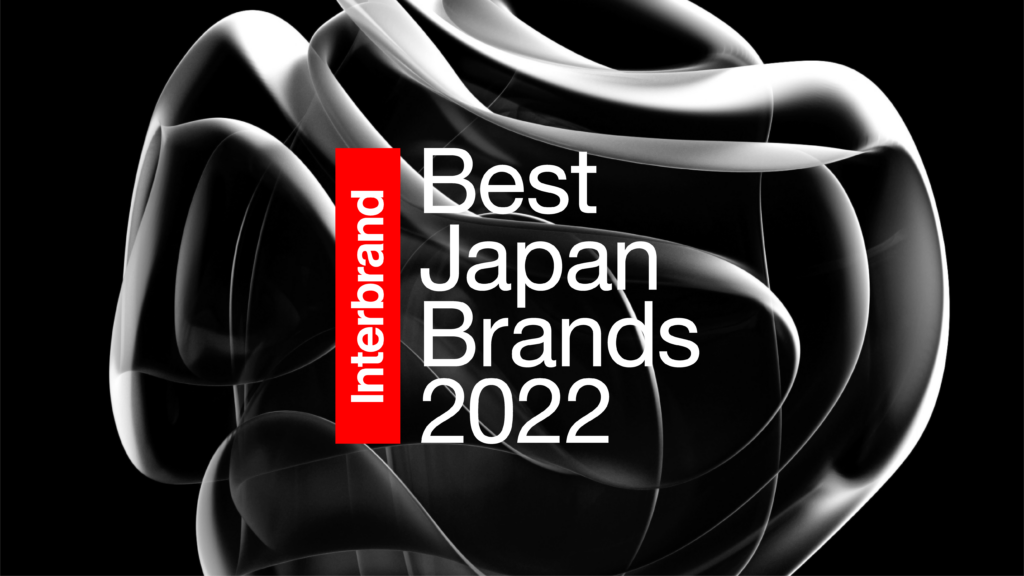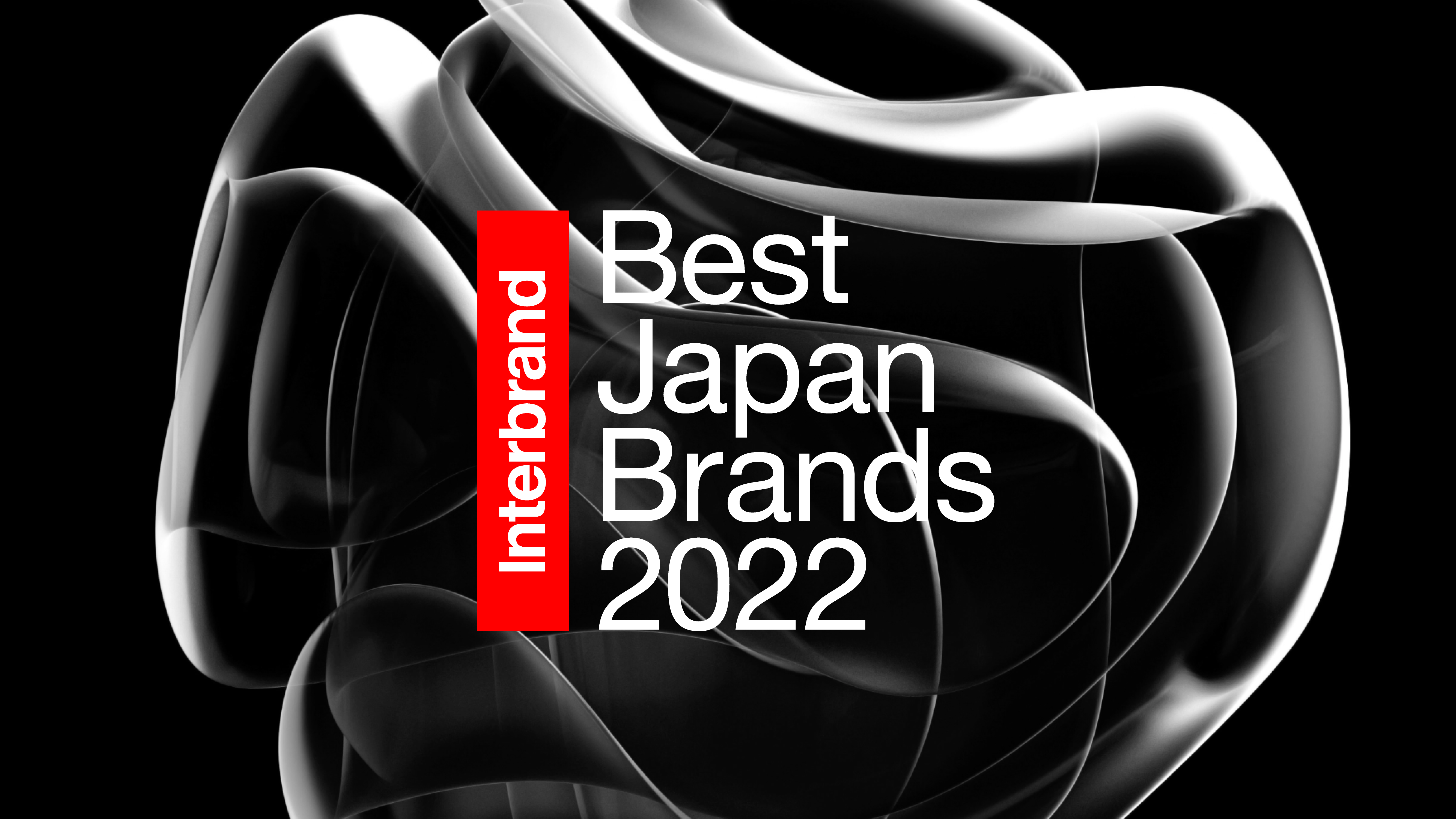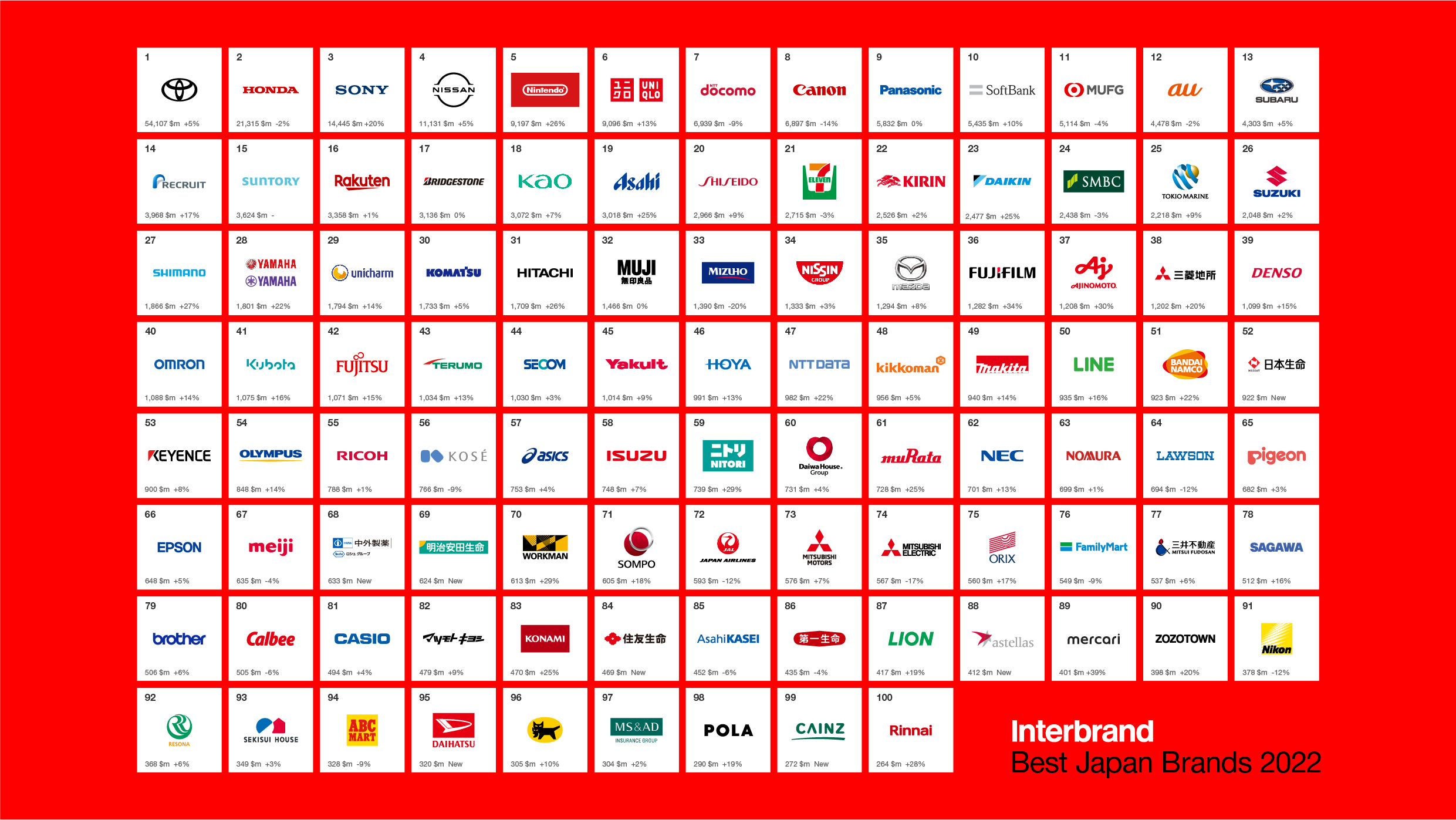
Interbrand “Best Japan Brands 2022”
Announcing the Top 100 Japanese Brands Ranked by Brand Value

- The total brand value of Japan’s Top 100 brands grows 6.9% from 2021 (last year it decreased -3.9% from 2020)
- Only 21 brands see a declining value (the number was 48 in 2021), and the value of the leading brands is on a recovery trend
- Toyota ranks #1 in Best Japan Brands for the 14th consecutive year
- Mercari increases by 39%, the highest growth rate this year
- Nissay, Chugai, Meiji Yasuda, Sumitomo Life, Astellas, Daihatsu, and CAINZ debut in the ranking as the scope of evaluation has been expanded
Interbrand Japan, Japan’s largest branding company (headquartered in Shibuya, Tokyo, President and CEO: Masahito Namiki), has announced Best Japan Brands 2022, a ranking of Japanese brand values using its proprietary Brand Valuation™ method to convert brand value into monetary value.
This is the 14th year these rankings have been announced. Best Japan Brands uses the same valuation methods used in Best Global Brands, a global brand value ranking Interbrand has announced every year since 2000. By comparing the value of leading global brands with that of Japanese brands using the same system of measurement, it examines the value of brands as business assets.
Starting this year, Interbrand has updated its criteria for evaluation in order to assess a wider range of Japanese brands. Specifically, it has changed the criterion from “financial listing” to “publication of various financial information or availability of audited financial information.” For the first time, it also now encompasses the pharmaceutical category.
Overview of Best Japan Brands 2022
The average year-on-year growth rate of all 100 brands ranked in Best Japan Brands 2022 was +8.6% (last year it shrank -0.5%), the number of brands with a decrease in value was 21 (it was 48 last year), and the total brand value of the top 100 brands was $254 billion (+6.9% year-on-year). All these measures show signs of a recovery in brand value despite the prolonged Covid-19 pandemic.
An analysis of the similarities among brands that have significantly increased their brand value confirms the trend toward high levels of Trust, Agility, and Participation among the 10 elements of the Brand Strength Analysis (see page 9). Compared to 2021, when the three factors of Trust, Agility, and Empathy had a high impact, we can see a change in the growth of brands that can co-create value with customers (Participation), rather than the ability to understand customer needs (Empathy), in addition to Trust and Agility.
Covid-19 has brought both uncertainty and possibility into consideration, and the environment surrounding people is changing rapidly. A strategy based solely on the corporate perspective, as has been the case in the past, will not gain popular support and may even jeopardize the survival of a sustainable society.
Interbrand believes that we have entered an era in which it is necessary to develop a “Human Strategy” that focuses on ambiguity of “people”—charting a course for future growth by understanding people’s deepest thoughts and feelings, such as the behavior of customers and the criteria for making decisions, and the attitudes and backgrounds of employees working for companies, which have changed dramatically over the past few years and continue to change.
To grow its business in the future, each brand needs to have a North Star as its destination and a foundation for its activities, and that foundation needs to be a solid, unshakeable truth. Purpose and humanity play a role, and it is the role of the brand to give it a soul.
Top 5 Growing Brands (year-on-year growth of brand value)
Mercari (89th, +39% YoY)
In line with its mission of “creating a global marketplace that generates new value,” Mercari is further promoting cross-border sales and strengthening this service through synergies with Mercoin, Merpay, etc.
In response to the growing desire to use the service among middle-aged and older people, it is expanding its target audience by distributing the “Mercari Set for 60 and up.” In addition, it has partnered with Uber in the
U.S. to launch “Mercari Local,” established a group company, Souzoh, to plan, develop, and operate new businesses, and launched the “Mercari Shops” business which enables users to set up stores within Mercari.
Fujifilm (36th, +34% YoY)
Fujifilm has restructured its operations into four business segments: Healthcare, Materials, Business Innovation, and Imaging, leveraging the advanced and unique technological capabilities cultivated through its photography business. Group company Fuji Xerox Co., Ltd. has also changed its name to FUJIFILM Business Innovation Corp.
Campaigns such as “NEVER STOP 2021” and “Accelerate your business success” convey a consistent message globally. The Group is promoting e-learning using the FUJIFILM Corporate Movie to increase understanding of its vision among all employees in Japan and overseas, and is accelerating the development of a new Fujifilm brand.
Ajinomoto (37th, +30% YoY)
Since its mid-term management plan in 2017, Ajinomoto has promoted long-term, continuous brand management based on the visualization of brand value. Ajinomoto has incorporated the concept of ASV (Ajinomoto Group Shared Value), which creates economic value by solving social issues through business and creating value together with local communities and society, into a system called the “Corporate Value Enhancement Cycle.”
Under the strong leadership of its management, Ajinomoto’s Purpose Branding aims to improve people’s wellness by solving food and health issues. This has also led to strong business performance as the brand’s purpose is evaluated through customer experiences, such as in the comments of respondents to its survey: “I sympathize with the Eat Well, Live Well catchphrase, it contains all my thoughts.” This has resulted in an 86% increase in brand value growth over the six years since Best Japan Brands 2016.
WORKMAN (70th, +29% YoY)
WORKMAN aims to be a company that is friendly both to the environment and to its users, and is strengthening its business model and product development to reduce its impact on the global environment. It has developed products and services that focus on women raising children, such as the “Mom’s Easy Fitting Room,” and has entered the outdoor equipment business through joint development with solo campers and backpackers.
In a survey, WORKMAN received many comments such as “they understand our needs” and “they have products that we want,” which emphasize the value of the WORKMAN customer experience. The company is taking innovative approaches to employee satisfaction such as eliminating overtime, deadlines, sales targets, and internal events, and developing products in an environment free of employee stress.
Nitori (59th, +29% YoY)
While its competitors struggle, Nitori has achieved 34 consecutive quarters of sales and profit growth. The company’s motto is “to provide people around the world with the richness of home.” In February 2021, Nitori established “Coordinate for Everyone” as its philosophy, aiming to realize the “richness of housing.” In a survey conducted by Interbrand, it was rated as a brand that “never stops developing products from the customer’s perspective.”
Based on its strengths as a manufacturing, logistics, and IT retailer, Nitori constantly takes on new challenges and evolves, such as its business integration with Shimachu, the expansion of its home appliance business, the N+ apparel brand for adult women from the Nitori Group, and the N-Warm and N-Cool bedding brands.

New Entrants
Nissay (52nd)
Nissay aims to put into practice “customer-oriented business operations” and is promoting activities to set policies and initiatives and disclose these initiatives’ results. In the medium- to long-term plan (2021-2023) “Going Beyond,” Nissay has established its management vision “To become an unshakable market leader” and the vision “To continue to support the future of our customers and society through people, services, and digital technology.” In addition, Nissay has announced a new corporate message, “Connecting Today and the Future,” to express its desire to stay close to the “today” of its customers and society and continue to deliver a secure “future.”
Chugai (68th)
Chugai’s mission is “to create new value through the provision of innovative medicines and services for the benefit of the medical community and human health around the world.” Its core values are “patient-centered, frontier spirit, and integrity,” and its vision is “to provide advanced, patient-centered and sustainable healthcare based on its unique scientific and technological capabilities in collaboration with Roche.” In addition, as part of its new growth strategy for 2030, the company has identified and is implementing five reforms: drug discovery reform, development reform, pharmaceutical reform, value delivery reform, and growth platform reform. As an embodiment of these reforms, the company is boldly developing therapeutic drugs for new coronavirus infections, such as antibody cocktail therapy.
Meiji Yasuda (69th)
As its philosophy, Meiji Yasuda has established “Reliable Peace of Mind, Forever.” Its corporate vision is “The most people-friendly life insurance company that continues to be chosen with trust,” and its values are “Customer Orientation and Ethics, Challenge and Creation, Collaboration and Growth.” Under MY Mutual Way 2030, a 10-year plan starting in April 2020, Meiji Yasuda has set its vision for the next 10 years as “To be the leading life insurer that brings health to people and vitality to communities.” Through its health promotion and regional development initiatives, such as “Minna no Kenkatsu Project” and “Local Genki Project,” Meiji Yasuda is developing the “Kizuna Movement,” an employee-driven bottom-up small group activity, to promote the penetration and establishment of its brand image and to encourage each employee to understand the importance of building the corporate brand and to take concrete and voluntary actions based on this understanding.
Sumitomo Life (84th)
Sumitomo Life has established a brand vision “Strengthening Your Future,” and has been promoting four advanced values: “advanced consulting and services that always and forever last,” “leading the industry in product development for a strong life,” “providing customer service of inspiring quality,” and “supporting a healthy life and a rich and bright senior life.” It has launched Vitality, a “health promotion type” insurance that offers discounts and refunds on premiums when health improves. A flagship store that does not sell insurance products was opened in Ginza, Tokyo, providing a place to experience a new service that is different from conventional insurance. It has shifted from “GNP” sales of “Giri (theory of Justice), Ninjou (human emotions) and Present” to “WIN” sales of “Well-being, (digital) Innovation, and Ningen-ryoku (human power).” In April 2021 the company launched a cross-divisional organization under the direct control of the president, the Human Resources Development Division, to focus on developing human resources capable of creating new value.
Astellas (88th)
Astellas has established a vision of “standing at the forefront of changing healthcare and transforming scientific progress into value for patients.” The Astellas Way is the common set of values of the Astellas Group, summarized in five messages: Patient Orientation, Initiative, Results, Diversity, and Integrity. One Astellas joins with the Astellas Way to form its HR Vision. The company aims to foster a corporate culture of “Patient-centricity” in which each employee acts with the patient in mind and reflects this in their daily work.
Daihatsu (95th)
Daihatsu has established the group slogan “Light you up” and the brand vision “Broadening life’s mobility to support various lifestyles around the world in freely enjoying brilliant individual lives.” Under the medium- to long-term management scenario “D-Challenge 2025” covering the period from 2017 to 2025, it aims to evolve the Daihatsu brand through mono zukuri (vehicle manufacturing) and koto zukuri (value creation by expanding contact with customers and local communities). Since its establishment, the brand has pursued SSC (Simple, Slim, and Compact) as its product concept.
CAINZ (99th)
CAINZ’s corporate philosophy is based on the Promise “Lala, Lala for Life” and the Vision “Changing the world from everyday life.” CAINZ has established the following core values: “Connect with Kindness,” “Create with Creation,” and “Surpass the Box.” The “Kumimachi” concept was formulated to strengthen the relationship between stores and the surrounding area through the resolution of local issues. With the keywords “stress-free,” “personalized,” “emotional,” and “community” for employees and customers, the company is developing various systems on its own at high speed under the concept of “IT retailing.” The organization has also been restructured into strategic business units (Professional, Lifestyle, and Daily Necessities) to match the customer focus, pursue customer value, and create unique PB products and stores.
About Best Japan Brands 2022 Brand Valuation
Criteria for Inclusion
To shed light on the value of global Japanese brands and enable comparison of their relative position against a common global measure, brands meeting the following criteria were selected for evaluation:
- The brand originated in Japan: The corporate or business brand is the product of a Japanese enterprise.
- Various financial information must be publicly available or audited financial information must be available.
- 2021 brand values were applied to brands ranked in Best Global Brands 2021.
- The brand is recognized in Japan.
Methodology
Interbrand’s methodology for evaluating brand value is based on the brand’s financial strength, influence on purchasing decisions, and contribution of future earnings. In the same way that securities analysts analyze and evaluate the value of a company, we analyze and evaluate the value of a brand by asking, “What is its future earning potential?” This methodology has been certified compliant with the ISO 10668, the global standard for measuring the monetary value of brands as established by the International Organization for Standardization. The evaluation is made up of the following three specific analyses:
- Financial Performance: Project the company’s future earnings
First, we estimate the current and future revenues of the business operating under the brand. We then subtract operating earnings, taxes, and capital cost of investment to calculate future economic profit. This analysis is based on publicly available or audited corporate information, and future projections are based on analysts’ estimates*.
*For analyst forecasts this evaluation relies on analysts’ estimates obtained from IFIS Japan, Ltd at https://www.ifis.co.jp/. The IFIS Consensus data https://www.ifis.co.jp/en/ used is current as of October 30, 2021.
2. Role of Brand: Derive the brand’s contribution to profits
Next, to derive the brand’s contribution to future economic profits as calculated in the analysis of financial performance, we analyze the brand’s influence on customer purchasing decisions. In evaluating the role that a brand plays in consumer purchasing trends, we perform benchmark analyses by industry that draw on our database of over 10,000 brand value evaluations accumulated over the past 20 years. Based on these industry benchmarks, we perform a proprietary analysis to derive a Brand Contribution Score.
3. Brand Strength: Evaluate the brand’s contribution to future earnings
Brand strength analysis measures a brand’s power to inspire what the client needs to sustain future earnings—market loyalty, repeat purchases by consumers, and lock in—and discounts brand earnings to derive a present value. Our evaluation offers a systematic means of determining a brand’s risk based on 10 factors key to brand vitality, and is represented on a scale of 0 to 100, with 100 being a perfect brand. Brands within the same industry are compared based on these factors, and the top brands are then compared to global brands in other industries.
This brand strength score is then converted into a discount rate a method unique to Interbrand, and this rate is used to discount future brand profits, thus calculating the brand value. Brand Role Analysis and Brand Strength Analysis are calculated using a wide variety of published reports and other documents, which are then assessed by consultants in each of our global offices.
About Interbrand
Interbrand is the world’s leading brand consultancy, established in London in 1974. For more than forty years, Interbrand has helped clients drive growth for both their brands and their business through a combination of strategy, creativity, and technology.
In this era of an unprecedented abundance of choices and rapid innovation despite increasing social uncertainty, customer expectations and values are changing faster than businesses are. At Interbrand, we believe it is crucial to explore the truth hidden behind these ever-changing human insights, understand customer thoughts and expectations as quickly as possible, make the decision to provide an experience that exceeds those expectations and take action. We call this decisiveness and action Iconic Moves™.
At Interbrand, our strategic team, which employs cutting-edge analyses measures such as Brand Valuation™, recognized by ISO as the world’s first global standard for measuring the monetary value of brands, has come together with our award-winning creative team to work on projects where we handle everything in-house, from analysis to strategy building, creative development, internal and external engagement, and support for incorporating brand into management indicators to create innovation throughout the organization.
About Interbrand Japan
Interbrand Japan was established in 1983, the third office in Interbrand’s global network, following London and New York. Together with C Space (headquartered in Boston and London, Japanese office in Shibuya, Tokyo), a customer agency that has developed globally to help companies incorporate the customer’s perspectives into its business through online community management and co-creation workshops with customers, we provide total branding services for a variety of organizations including Japanese enterprises, international companies, governments, and public agencies. Please visit https://www.interbrandjapan.com to learn more.